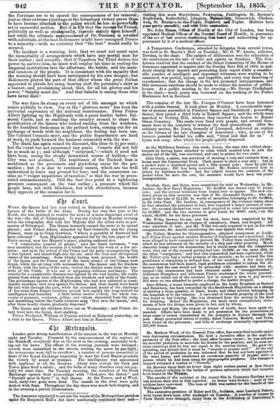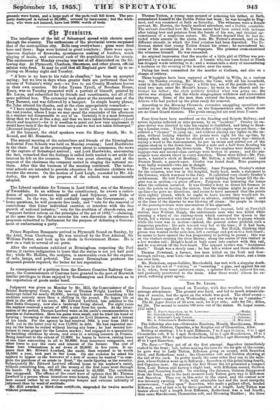t br 311 rtrnp uli i.
London gave strong manifestation of its interest in the war on Monday night and Tuesday. Prepared by the announcement of the capture of the Malakoff, everybody was on the alert in the evening, anxiously look- ing out for news. The offices of the evening journals were besieged ; crowds were assembled in the streets, reading the news by gas-light ; the newsrooms were full to overflow ; a number of persons assembled in front of the Royal Exchange expecting to hear the Lord Mayor proclaim the victory by sound of trumpet. The intelligence was announced with applause at all the theatres. About nine o'clock the Park and Tower guns fired a salute ; and the bells of many churches rang out joy- fully for some time. On Tuesday morning, the members of the Stock Exchange opened their proceedings with " God.save the Queen" and "Partant pour la Syrie" in full chorus. At the Tower, and at Wool- wich, sixty-two guns were fired. The vessels in the river were gaily decked with flags. Throughout the day there was much bell-ringing, and in the evening a partial illumination. London gave strong manifestation of its interest in the war on Monday night and Tuesday. Prepared by the announcement of the capture of the Malakoff, everybody was on the alert in the evening, anxiously look- ing out for news. The offices of the evening journals were besieged ; crowds were assembled in the streets, reading the news by gas-light ; the newsrooms were full to overflow ; a number of persons assembled in front of the Royal Exchange expecting to hear the Lord Mayor proclaim the victory by sound of trumpet. The intelligence was announced with applause at all the theatres. About nine o'clock the Park and Tower guns fired a salute ; and the bells of many churches rang out joy- fully for some time. On Tuesday morning, the members of the Stock Exchange opened their proceedings with " God.save the Queen" and "Partant pour la Syrie" in full chorus. At the Tower, and at Wool- wich, sixty-two guns were fired. The vessels in the river were gaily decked with flags. Throughout the day there was much bell-ringing, and in the evening a partial illumination.
The Assessors appointed to set out the wards of the Metropolitan parishes wader Sir Benjamin Hall's Act have assiduously continued their task-
. •
visiting this week Marylebone, Newington, Paddington, St. Saviour's Southwark, Rotherhithe, Islington, Remaondstly, Greenwich, Clerken- well, St. Martin's-in-the.Fields, Deptford, and Poplar. Matters have
gone pretty smoothly, and with little cep n,
Mr. John Simon, Officer of Health of the City of London, has been appointed Medical Officer of the General Board of Health, in pursuance of the act of last session continuing that board and authorizing the ap- pointment by it of a medical officer.
A Temperance Conference, attended by delegates from several towns, was held at St. Martin's Hall on Tuesday ; Mr. G. W. Anstie, solicitor, Devizes, in the chair. The subject of deliberation was the relaxation of the restrictions on the sale of beer and spirits on Sundays. The Con- ference resolved that the conduct of the Select Committee of the House of Commons appointed to inquire into the Sunday Beer Bill of 1854, in sud- denly closing their inquiry and presenting their report while a consider- able number of intelligent and important witnesses were waiting to be examined, was partial, unjust, and impolitic, and every way deserving of reprehension; that the change in the law promoted intemperance, and that strenuous exertions should be made to reduce the number of public- houses. At a public meeting in the evening,—Mr. George Cruikshank in the chair,—much praise was bestowed on the working of the Forbes Mackenzie Act in Scotland The remains of the late Mr. Feargus O'Connor have been honoured with a public funeraL It took place on Monday. A considerable num- ber of persona assembled in Finsbury Square and Smithfield ; proceeding thence, they joined a third body in Russell Square ; and the whole mass marched to Notting Hill, whence they escorted the hearse to Kensal Green Cemetery. The roads were lined with people, and several thou- sands were in the cemetery to witness the final proceedings. After the ordinary service, Mr. Jones, formerly of Liverpool, delivered an oration on the virtues of the late champion of democracy ; who, as one of the banners paraded behind his coffin said, "lived and died for us." A hymn was sung ; after which the people quietly dispersed.
At the Middlesex Sessions, this week, Lucas, the man who robbed shop- keepers by having hairs attached to coins which enabled him to jerk the money out of the till, was convicted, and sent to prison for two years.
John Clark, a sailor, was convicted cf stealing a coat and contents from a house near the Commercial Road. Clark meant to steal a coat only ; but in a pocket were a hundred-pound and a fifty-pound note; these he sold for 100 sovereigns ; 801. has been recovered. Mr. Bodkin sentenced him to prison for eighteen months : had the culprit known the contents of the pocket when he stole the coat, the sentence would have been ten years' transportation.
Strahan, Paul., and Bates, were committed for trial on Wednesday, by Mr. Jardine the Bow Street Magistrate ; Dr. Griffith was bound over to prose- cute; and the several witnesses were bound over to appear. The new evi- dence given on this occasion was that of Mr. Alexander Beattie ; who de- posed to the sale of 12,1281. os. worth of securities belonging to Dr. Griffith, by Sir John Paul. Mr. Jardine, in consequence of the evidence taken since he first admitted the prisoners to bail, now required a larger amount of sure- ties : the accused themselves were each required to enter into recognizance& for 10,000/., and the two sureties to give bonds for 50001. each,—on the whole, 60,0001. for the three prisoners.
Mr. Wilke, brewer, his Don, and his clerk, have been committed by the Westminster Magistrate on charges of conspiracy, fraud, and forgery. All were admitted to bail ; and Mr. Wilke was only required to put in his own recognizances, Mr. Arnold considering the case against him weak.
Mr. Talbot, Member for Glamorganshire, obtained summonses at Guild- hall Police Court against another Member of Parliament and a merchant, who were alleged to have conspired to prevent Mr. Talbot from realizing 10,0001. which he had advanced on the security of a ship and other property. Much obscurity hangs over the transaction, but it would seem that the allegations were, that one of the accused parties had lent 10,0001. on the same ship to the other " conspirator," and that this transaction had been registered, while Mr. Talbot only had a verbal promise of the security ; so he accused the two gentlemen of conspiring to defraud him of his security. A few days after the summonses had been issued, legal gentlemen attended to inform the Al- dermen that the ease would not be proceeded with : matters had been ar- ranged—the summonses -had been obtained under a " misapprehension?' Alderman Humphery and Alderman Finnis condemned the whole proceed- ing, as an unfair use of the criminal law to compel a man to pay money., But since no one attended to prefer a charge, the matter dropped. Jane Gibson, a nurse formerly employed in the Army Hospitals at Scutari and Balaklava, has been remanded by the Southwark Magistrate on a eharge of stealing a large quantity of linen, books, and other articles belonging to the hospitals or to the inmates. A cart-load of valuable property of the kind was found at her lodging. She was dismissed from the service in the East for drinking. Before the Magistrate, she made most contradictory state- ments of how the things were given to her, and by whom.
Cortazor and Masip, the forgers of letters of credit, have been again re- manded. Efforts have been made to get possession for the prosecutors of large sums of money transmitted by the prisoners to France through the poet. Many pretended letters of credit, dated Valencia, Madrid, and Paris, were found on the prisoners ; and bills of exchange nominally representing 352,000 francs.
Mr. Mathew Wood, of the General Poet-office, has committed suicide under very distressing circumstances. He held a lucrative office in the mail de- partment of the Post-office; the head office became vacant; he was allowed six months' probation to ascertain his fitness for the position, and he soon be- came conscious that he was not equal to the onerous duties. He grew de- sponding, and hinted that it must be "success or prussic acid." At the end of the period of probation he was informed that he had not been appointed. He went home, and swallowed an enormous quantity of prussic acid—a poison which he bad been using for photographic purposes. The Coroner's inquest returned a verdict of "Ineanity." On Monday there were no fewer than eight notices posted at Bow Street Police-station relating to the bodies of persons unknown which had recently ben found in the Thames.
The results of the accident at the recent fate in Cremorne Gardens were less serious than was at first reported : no bones were broken ' • most of the soldiers have recovered. The sum of 849L was netted for the benefit of 'the. Wellington College. The extensive premise& of Baker and Co., .builders, near Lambeth Palace, were burnt down soon after midnight ea Tuesday. A number of houses in Paris Street were damaged, many trees in the Arebbishop of Cantexhury'gt grounds were burnt, and a large part of the park-wall fell down. The pro- perty destroyed is valued at 50,0001., covered by insurances ; but the work- men, who were not insured, have lost 30001. worth of tools.



























 Previous page
Previous page